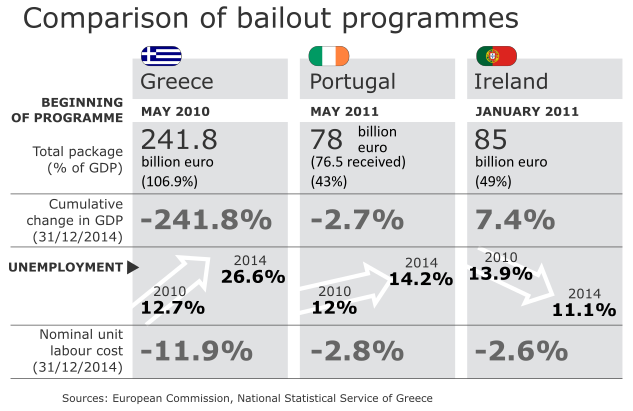While the Greek government is counting the "pennies" in state funds to carry through to the end of the month, Portugal and Ireland have started to repay their loans to the International Monetary Fund, and earlier than planned at that. This fundamental contradiction raises the question as to why has the memorandum worked in other countries and not in Greece?
The answers are not one-sided. Technocrats and politicians in, and out of, Greece argue that the budget consolidation programme has worked in the country too, despite the high social and economic price. On the other hand, there are technocrats and politicians, including even members of the supervisory Troika, who recognise that the Greek programme has failed, the reasons for this being very specific:
Firstly, Greece was the first euro zone member threatened with bankruptcy. "In 2010, the euro zone had no experience in dealing with such a crisis. The necessary changes in the way of work were introduced in connection with the situation in Greece but many mistakes were made along with them," the representatives of the International Monetary Fund told Kathimerini newspaper. According to them, they were the following:
- The euro zone did not accept to haircut the Greek government debt before the start of the bailout programme. The words "haircut" and "bailout" were banned in the euro zone. However, at the political level, there was a transition from "no bailout" to "bailout" which was how the European rescue mechanism was created. However, the issue of haircutting the debt was not solved on time in a country that had a problem with its huge external debt. Thus, a programme was launched that burdened even more the debt. All these issues had been resolved in Portugal and Ireland before the two countries had requested assistance in 2011, but in all cases, their problem was four times milder than that of Greece.
- The European Union had no experience and knowledge relating to the rescue and restructuring of economies. Therefore, it requested the assistance of the International Monetary Fund, which has experience especially in solving problems with liquidity and national debts as well as with the deep structural problems of the Greek economy and government. "I remember the European Commission integrating into Greece’s commitments under the first memorandum all European directives which the country had not adopted until that time. They ranged from closely related to the problem to not at all related to it," says a member of the technical teams of the supervisory Troika.
- The euro zone refused to provide more funds, thus drawing up a 3-year programme. This meant a huge budget consolidation in a very short time (austerity measures and high recession) and in the presence of an unsustainable external debt in a country with serious structural problems at all levels. This mixture caused the Greek economy to explode.

Secondly, the political government and senior representatives of the ministries in Greece had no experience and desire to conduct real reforms. During the first two years, Greece just passed laws without carrying out any changes in practice. The consolidation took place only through income cuts and tax increases. I.e the easy solution was preferred.
Thirdly, Greece was unable to negotiate and there was no dialogue in fact. The Troika expected that the representatives of the ministries were more aware of the national economy and could make proposals or reject certain measures on the basis of specific arguments and figures. However, this happened only in a number of cases. Thus, the discussion and negotiations became a monologue by the lenders, "Okay, if you cannot offer anything, apply these measures. Otherwise, you will not obtain money." The only simple solution, a proposal in response, was, "Instead of a specific reform (e.g. cuts in the public sector) could we increase taxes and further cut costs?" When this situation reached its limits, the proposal in response was only partly accepted, until the next monitoring during which they again agreed on more spending cuts and fewer reforms.
Fourthly, upon arriving in Athens, the first expert teams of the supervisory Troika faced a quite abandoned administration - a complete lack of electronic records, structure and of basic data. "The situation reminded us of a mission in Egypt," said a representative of the European Commission.
Half-way reforms and budget cuts
In this case, isn’t the biggest budget consolidation in history that was carried out in Greece an achievement? Of course it is, but if one constantly cuts costs and increases taxes it is normal to attain budget surpluses. The question is that one does not improve the economy, does not make it more competitive, does not limit the burden of cuts only among taxpayers and workers. The following is a good example of this: Despite the high recession (20.3% from 2010 to 2014) the general price level increased while the revenue declined. The government carried out a labour law reform that affected workers and resulted in a reduction of labour cost. The data of the supervisory Troika, however, showed that the prices of goods and services, and company profits, had increased. In other words, the income of employees had been transferred to companies, which was because markets and professions were not liberalised, there was no fight against monopolies, etc. Therefore, half-way reforms and major budget cuts mean double pain with no result.